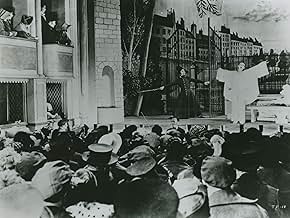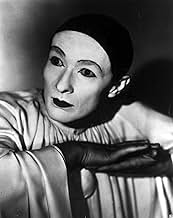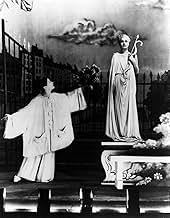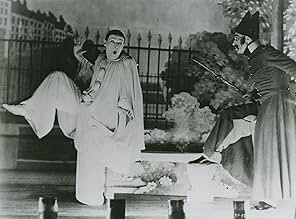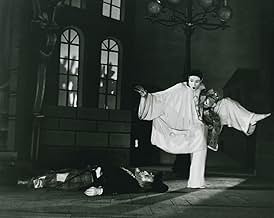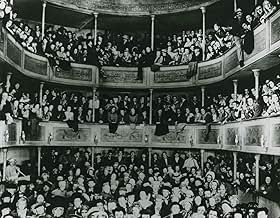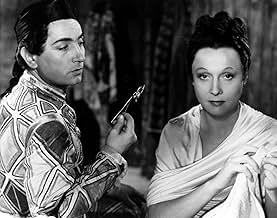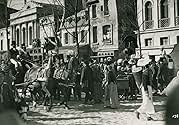VALUTAZIONE IMDb
8,3/10
22.015
LA TUA VALUTAZIONE
La vita teatrale di una bella cortigiana e dei quattro uomini innamorati di lei.La vita teatrale di una bella cortigiana e dei quattro uomini innamorati di lei.La vita teatrale di una bella cortigiana e dei quattro uomini innamorati di lei.
- Regia
- Sceneggiatura
- Star
- Candidato a 1 Oscar
- 2 vittorie e 1 candidatura in totale
María Casares
- Nathalie
- (as Maria Casarès)
Palau
- Le régisseur des Funambules
- (as Pierre Palau)
Etienne Decroux
- Anselme Debureau
- (as Étienne Decroux)
Jane Marken
- Mme Hermine
- (as Jeanne Marken)
Raymond Rognoni
- Le directeur du Grand Théâtre
- (as Rognoni)
Recensioni in evidenza
10geroldf
*Enfants* is a work of genius. I won't say it's the greatest film of all time, because its scope is very narrow: the mystery of the heart, the wayward course of love, the bittersweet joy and sorrow of lovers. Maybe that isn't so narrow after all, but it doesn't cover quite as wide a spectrum as other great films (seven samurai, casablanca, mahabharata, key largo etc). Nonetheless, this film belongs in that same company, for an unsurpassed portrayal of loves lost and won, and also the passion of art, a form of love expressing itself in public creativity, enriching the lives of many. Love between lovers enriches them alone; art enriches the world.
The woman Garance is loved by 4 men in this film. Two of them, at least, are superb renditions of genius-in-creation: the mime Baptiste, and the actor Frederick. Both are geniuses, but while Baptiste is silent, weak, and sad, Frederick is loud, powerful, irrepressively optimistic, courageous and generous. He is one of the greatest characters ever to grace the screen. He has one flaw: his genius is so pure, he has a blind spot regarding the weaknesses of others. He cannot conceive of an emotion such as jealousy, and so can never play Iago - until Garance, the fallen woman, finally teaches him.
The other character who may be a genius is Lacenaire, but he is a criminal genius. Evil, twisted, burning with hatred, he has only one true and honest anchor in society - his love for Garance. It doesn't save him, but it keeps him from being as bad as he could be.
Without going into the whole plot (it's long and convoluted) the primary paradox relates to intersecting and disconnected paths of love between the characters. Garance is loved by 4 men, but she really only loves Baptiste. So does Nathalie, a sweet and simple girl, who has the courage to do what Baptiste can not: she declares her love, and so they marry and have a child. Baptiste lacks the strength to take Garance when he has the chance, and so no one is happy - except maybe Frederick, he lives as life should be lived, and even the pain of losing Garance turns to gold in the alchemy of his art.
But despite the pain, and the unhappiness, loss and death, the world of *enfants* is beautiful. It's a world where love and art mean more than success or failure, a world where money is irrelevant and the passion for life burns away the curtain between fantasy and reality. It's three hours of *paradis*!
10/10, with a bullet through the heart.
The woman Garance is loved by 4 men in this film. Two of them, at least, are superb renditions of genius-in-creation: the mime Baptiste, and the actor Frederick. Both are geniuses, but while Baptiste is silent, weak, and sad, Frederick is loud, powerful, irrepressively optimistic, courageous and generous. He is one of the greatest characters ever to grace the screen. He has one flaw: his genius is so pure, he has a blind spot regarding the weaknesses of others. He cannot conceive of an emotion such as jealousy, and so can never play Iago - until Garance, the fallen woman, finally teaches him.
The other character who may be a genius is Lacenaire, but he is a criminal genius. Evil, twisted, burning with hatred, he has only one true and honest anchor in society - his love for Garance. It doesn't save him, but it keeps him from being as bad as he could be.
Without going into the whole plot (it's long and convoluted) the primary paradox relates to intersecting and disconnected paths of love between the characters. Garance is loved by 4 men, but she really only loves Baptiste. So does Nathalie, a sweet and simple girl, who has the courage to do what Baptiste can not: she declares her love, and so they marry and have a child. Baptiste lacks the strength to take Garance when he has the chance, and so no one is happy - except maybe Frederick, he lives as life should be lived, and even the pain of losing Garance turns to gold in the alchemy of his art.
But despite the pain, and the unhappiness, loss and death, the world of *enfants* is beautiful. It's a world where love and art mean more than success or failure, a world where money is irrelevant and the passion for life burns away the curtain between fantasy and reality. It's three hours of *paradis*!
10/10, with a bullet through the heart.
It is an epic. One of the best films ever made. The script and the dialogues show that the genius of Jacques Prévert wasn't made only for written poetry but for poetry in motion as well.Carné's camera is precise and makes one feel like a real witness of the plot. All in all a lesson of how to make a film yesterday, today and tomorrow.
One day in 1966 I was walking along 8th Street in the Village. The Village was where I went when I had no where else to go, when I belonged no where, where I thought I could discover myself. It didn't hurt that there were people to stare at, without being too obvious about it.
It was a gray day and it started to rain. I stopped under the first protection I found, a movie marque - neither handsome nor attractive.
The photos promoting the film were behind glass at odd angles, held by tacks. I just wasn't in the mood. It wasn't what I was looking for. But the rain got worse, and I needed warmth. So I bought my ticket to join the twenty or so people who comprised the full audience.
From its first moment, the film pulled me in. After a frenetic start, it quieted to Jean-Louis Barrault sitting alone on a barrel. I'd seen Marceau before, but not until now had I seen the quiet poetry of true mime.
Barrault's character, Baptiste, had silently observed the theft of a watch. Baptiste pantomimed the theft but staged his pantomime as if people's perceptions were a mistake, as if the theft never took place. In the doing, he made everyone laugh. He did this for the love of Garance, played by Arletty, whom he had seen for the first time.
There follows in the film first love - unrequited, poetic, soulful. We see villainy, melodrama, danger, heroism, satire, plays within plays - a host of stories all integral to the whole of the play. And we believe completely.
It is the most complete film ever made. It changed my life.
It was a gray day and it started to rain. I stopped under the first protection I found, a movie marque - neither handsome nor attractive.
The photos promoting the film were behind glass at odd angles, held by tacks. I just wasn't in the mood. It wasn't what I was looking for. But the rain got worse, and I needed warmth. So I bought my ticket to join the twenty or so people who comprised the full audience.
From its first moment, the film pulled me in. After a frenetic start, it quieted to Jean-Louis Barrault sitting alone on a barrel. I'd seen Marceau before, but not until now had I seen the quiet poetry of true mime.
Barrault's character, Baptiste, had silently observed the theft of a watch. Baptiste pantomimed the theft but staged his pantomime as if people's perceptions were a mistake, as if the theft never took place. In the doing, he made everyone laugh. He did this for the love of Garance, played by Arletty, whom he had seen for the first time.
There follows in the film first love - unrequited, poetic, soulful. We see villainy, melodrama, danger, heroism, satire, plays within plays - a host of stories all integral to the whole of the play. And we believe completely.
It is the most complete film ever made. It changed my life.
10jim-574
Film Review by Jim Richardson
First published in "Der Stump" 7/16/75
GREATEST FILM EVER MADE
The greatest film ever made is director Marcel Carne's "Children of Paradise" with script by Jacques Prevert. It's hard to say more.
In Paris of the 1840's on Le Boulevard du Crime, Carne's camera soars through sideshow entertainments of every description. The motion picture has just begun. No characters introduced. Already the audience is gasping, dizzy, lost in a swirl of romantic imagery. We are inside a theatre sharing the cheapest seats in the last row of the top balcony near the ceiling with the "children of paradise." We forget ourselves and any notion that a film has to be "realistic" as we float along catching Carne's glimpse of this lost, fantastic era. The movie moves. It overflows with art and intelligence; we are totally under its spell of romance and beauty.
As the story unfolds, we watch it in a daze. There is suffering and sudden death. But no leaden hand is telling us this is a stylized allegory dealing with the paralysis of an occupied France. This is the kind of film people make when they may die tomorrow: we are compelled to receive it on the edge of our seat, every nerve tingling with desperate anticipation. We don't need to know that it was made between 1943-45 when some of the filmmakers were being hunted by the Gestapo, that starving extras stole banquets before they could be photographed.
Every movement the performers make is studied, made perfect as though this would be the last time any of them were to act. Garbo interests you? Meet Arletty. The ideal twentieth century woman. Witty. Controlled. Passionate. When she comes to her lover she glides toward the camera, walking without the use of her feet. Impossible? Not this time.
Jean-Louis Barrault playing Baptiste Debureau, the greatest French mime who created Pierrot (a pale, love-sick, ever-hopeful seeker after happiness) -- Barrault transcends the man's legend with elegant pathos. And the way he moves. Like a feather. How did he learn that?
The man who taught him plays his father in the film. As a matter of fact, Etienne Decroux taught Marcel Marceau as well. What does Decroux think of Marceau's popular mime? Snarls, "Walt Disney!"
Mime is serious to Decroux. At some of his performances if the audience interrupts with applause, he is insulted and immediately retires from the stage!
In the film, we see Barrault do many of Decroux's mime exercises during moments of Debureau's performances. Does Decroux think this is a good film? It is said that when he views it, tears run down his cheeks as he mouths all the lines.
But the film is not just about mime. Pierre Brasseur plays the most renowned romantic actor in France, Frederick LeMaitre. Decroux doesn't want him in his mime company at first because it's so obvious that "he's an actor." Frederick gets his break when he mocks a playwright by turning the man's melodrama into a farce. Years pass and both actor and mime become successful. But the actor cannot play "Othello" because he is so vain nothing can make him feel jealousy. That's right: Arletty cures him!
And there are aristocrats, and murderers, and thieves. And the film is over three hours long without a break. And you will be surprised how fast those three hours disappear!
You will be overcome with a feeling of ecstasy; you will sign, you will cry. And as your breath is taken away you will be left with so much you never knew before, that you always thought existed; something will have happened to you for the first time, and forever. Now is the time to fall in love with the best there is!
First published in "Der Stump" 7/16/75
GREATEST FILM EVER MADE
The greatest film ever made is director Marcel Carne's "Children of Paradise" with script by Jacques Prevert. It's hard to say more.
In Paris of the 1840's on Le Boulevard du Crime, Carne's camera soars through sideshow entertainments of every description. The motion picture has just begun. No characters introduced. Already the audience is gasping, dizzy, lost in a swirl of romantic imagery. We are inside a theatre sharing the cheapest seats in the last row of the top balcony near the ceiling with the "children of paradise." We forget ourselves and any notion that a film has to be "realistic" as we float along catching Carne's glimpse of this lost, fantastic era. The movie moves. It overflows with art and intelligence; we are totally under its spell of romance and beauty.
As the story unfolds, we watch it in a daze. There is suffering and sudden death. But no leaden hand is telling us this is a stylized allegory dealing with the paralysis of an occupied France. This is the kind of film people make when they may die tomorrow: we are compelled to receive it on the edge of our seat, every nerve tingling with desperate anticipation. We don't need to know that it was made between 1943-45 when some of the filmmakers were being hunted by the Gestapo, that starving extras stole banquets before they could be photographed.
Every movement the performers make is studied, made perfect as though this would be the last time any of them were to act. Garbo interests you? Meet Arletty. The ideal twentieth century woman. Witty. Controlled. Passionate. When she comes to her lover she glides toward the camera, walking without the use of her feet. Impossible? Not this time.
Jean-Louis Barrault playing Baptiste Debureau, the greatest French mime who created Pierrot (a pale, love-sick, ever-hopeful seeker after happiness) -- Barrault transcends the man's legend with elegant pathos. And the way he moves. Like a feather. How did he learn that?
The man who taught him plays his father in the film. As a matter of fact, Etienne Decroux taught Marcel Marceau as well. What does Decroux think of Marceau's popular mime? Snarls, "Walt Disney!"
Mime is serious to Decroux. At some of his performances if the audience interrupts with applause, he is insulted and immediately retires from the stage!
In the film, we see Barrault do many of Decroux's mime exercises during moments of Debureau's performances. Does Decroux think this is a good film? It is said that when he views it, tears run down his cheeks as he mouths all the lines.
But the film is not just about mime. Pierre Brasseur plays the most renowned romantic actor in France, Frederick LeMaitre. Decroux doesn't want him in his mime company at first because it's so obvious that "he's an actor." Frederick gets his break when he mocks a playwright by turning the man's melodrama into a farce. Years pass and both actor and mime become successful. But the actor cannot play "Othello" because he is so vain nothing can make him feel jealousy. That's right: Arletty cures him!
And there are aristocrats, and murderers, and thieves. And the film is over three hours long without a break. And you will be surprised how fast those three hours disappear!
You will be overcome with a feeling of ecstasy; you will sign, you will cry. And as your breath is taken away you will be left with so much you never knew before, that you always thought existed; something will have happened to you for the first time, and forever. Now is the time to fall in love with the best there is!
1995 was the centennial of the invention of movies. In Stockholm the event was celebrated, inter alia, by showing 'Les enfants du paradis' free of charge on the French National Day. It was presented as the best French movie ever made. Perhaps it was felt not to be polite toward other countries to talk of the best movie made in any countries. But many (not all) experts agree that it is indeed so. And so do I. I saw the film for the first time in 1954, and have never changed my mind about its paramount position. But whatever you may think in this respect, one of the most prominent features is that the movie is a 'GESAMTKUNSTWERK'. This word was invented by Richard Wagner to indicate a work in which music, text, and visual arts fuse or amalgamate into a unity. Concerning the movie at hand, the word is of course taken in a different sense. The movie contains all kinds of cinematic categories: mass scenes perhaps with 10'000 extras, chamber play with close-up photos of emotional faces, deep and genuine love, superficial sex, friendship, comic pantomime, tragic pantomime, comic theatre (that is, both the theatre scene and the public on the screen), tragic theatre, murder, hand-to-hand-fighting, pocket-picking, etc. And everything put together into one single film. Even more, whenever a section is comic, it rests so completely in the comic mood that the spectator cannot imagine that the entire movie was not comic from the first beginning, and will not remain so to the last end. Whenever it is tragic, it rests equally completely in the tragic mood, as if it had never been anything else than tragic and would never leave the tragic mood. Despite this heterogeneity, the movie does not split up in disparate fragments, but forms a genuine whole. The writer was the really great poet Jacques Prévert, and it tells much about his unusual competence that, on the one hand, each scene is superb when seen in isolation and, on the other hand, each scene does not therefore fit less perfectly in the film as a whole. - - - To some people it may be interesting to know that four of the roles are real historical persons: the actor Frederick Lemaître, the pantomimic performer Baptiste Debureau, the mediocre gangster Jean-François Lacenaire, and the latter's assistant Avril. Lacenaire was executed in 1836. His memoirs, which were written while he awaited execution, are published in English translation.
Lo sapevi?
- QuizFilming was completed a short time before D-Day and the director, having planned to distribute the film after the liberation of France, had three copies printed and concealed in three different places: a cellar of the Banque de France, a strongbox of Pathé and a Provence country house.
- BlooperIn the outdoor market scene, the amount of food laid out on the tables varies from shot to shot. The reason is that the extras were famished from years of wartime food rationing, and stole food whenever they were not closely watched.
- Citazioni
Frederick: Words and phrases leave you cold. You tell your story without speaking. And you do it so well. You really astonished me. Your legs speak, your hands answer. A glance, a shrug, a step forward, back and they understand up in the Gods.
Baptiste: They understand, though they are poor. I'm like them. I love them, I know them. Their lives are small, but their dreams are vast.
- Versioni alternativeThere are various alternate cuts of this film; the complete version runs 195 minutes and has been restored on video.
- ConnessioniEdited into Il était une fois...: Les enfants du paradis (2009)
I più visti
Accedi per valutare e creare un elenco di titoli salvati per ottenere consigli personalizzati
- How long is Children of Paradise?Powered by Alexa
Dettagli
Botteghino
- Budget
- 58.000.000 FRF (previsto)
- Lordo Stati Uniti e Canada
- 36.986 USD
- Fine settimana di apertura Stati Uniti e Canada
- 10.741 USD
- 11 mar 2012
- Lordo in tutto il mondo
- 44.906 USD
- Tempo di esecuzione3 ore 9 minuti
- Colore
- Mix di suoni
- Proporzioni
- 1.37 : 1
Contribuisci a questa pagina
Suggerisci una modifica o aggiungi i contenuti mancanti



